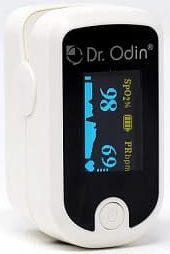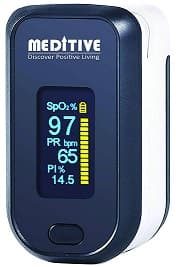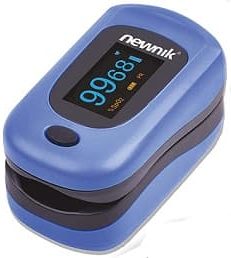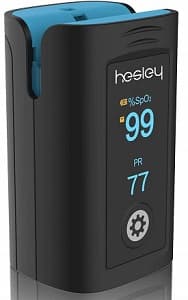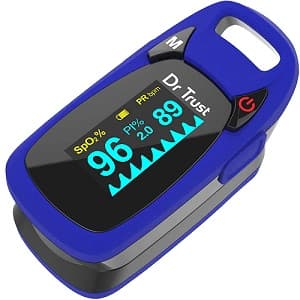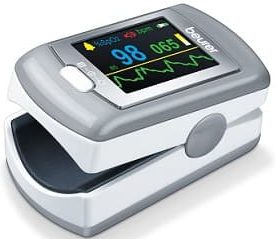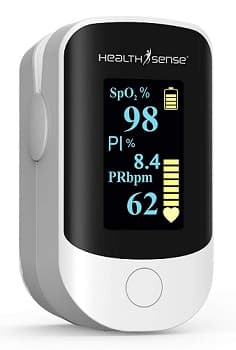Shortly after the pandemic (COVID-19) started, there has been a sudden surge in demand for face masks, alcohol-based hand sanitizer, touchless soap and sanitizer dispenser, nebulizers, Infrared Forehead thermometers, etc. Among these, a Pulse Oximeter is also now a highly demanding product.
The pulse oximeter is a tiny and compact device, that can measure your pulse rate and oxygen level in your blood.
It is now a must-have gadget not only for clinics and hospitals but also for your home use too.
This simple yet effective tool also comes very handy in detecting the Coronavirus infection to some extent.
But choosing the right and best pulse oximeter for your home use requires a lot more considerations. We recommend to read our Comprehensive Buying Guide on this, to know every single detail for choosing the right one.
What is a Pulse Oximeter?
A pulse oximeter is a small clip-on device that measures the heart rate and blood oxygen level in your body. The best part is that this whole process is painless. It is commonly used on patients suffering from respiratory illnesses like asthma, lung diseases, chronic obstructive pulmonary disease (COPD), etc.
It works by attaching the device to the patient’s fingertips. And some can also be attached to their nose, ear, toe, or forehead.
Some models are battery operated and offer real-time results on a small LED present on the device. While some connect with a wire to a separate vital sign monitor. This monitor records the precise information about your heart rate, body temperature, and blood pressure using other sensors connected to your body.
7 Best Pulse Oximeters In India
| Pulse Oximeters | Battery Type | Warranty | Buying Link |
|---|---|---|---|
| Dr. Odin Fingertip Pulse Oximeter+PI FS20E Read Review | 2 lithium ion batteries | 6 months | CHECK PRICE |
| Meditive Fingertip Pulse Oximeter Read Review | 2 AAA batteries | 1 Year | CHECK PRICE |
| Newnik PX701 Pulse Oximeter Read Review | 2 AAA batteries | 1 Year | CHECK PRICE |
| Hesley Fingertip Pulse Oximeter Read Review | 2 AAA batteries | 6 months | CHECK PRICE |
| Dr Trust Professional Series Finger Tip Pulse Oximeter Read Review | 2 AAA batteries | 1 Year | CHECK PRICE |
| Beurer PO80 Pulse Oximeter Read Review | 2 lithium ion batteries | 2 Years | CHECK PRICE |
| Healthsense FP910 Finger Tip Pulse Oximeter Read Review | 2 AAA batteries | 1 Year | CHECK PRICE |
Best Pulse Oximeter in India- Reviews
We have written the review of best oximeter available in India. Read the description, key features, pros and cons and make the selection according to your requirement. So lets start.
1. Dr. Odin Fingertip Pulse Oximeter+PI FS20E
Dr. Odin is one of the well-known brands for healthcare devices. So, this fingertip pulse oximeter comes to the top of our list for its outstanding performance and quality. The device is excellent in terms of accuracy and ease of use.
It comes in a sleek yet compact design that makes it easy to use anywhere and anytime. This oximeter allows you to measure the SpO2 level of the blood and heart rate with high accuracy. Even though you can also measure your pulse strength within ten seconds.
The large and wide display with six display modes ensures ease and clarity in viewing the readings. The four-way rotation display adds more convenience in taking and viewing the measurements.
Another best feature of this device is that it is water-resistant, adding durability to it. Also, this feature makes it an ideal choice for not only swimmers and athletes, but also for pilots and hikers.
One of the most supreme features of this best pulse oximeter is that it is suitable for all ages. Its finger chamber includes a smart spring system that can easily accommodate all finger sizes from kids to adults. So, you don’t need to buy a separate device for your kids.
A unique alarm function is also there with the device, alerting you if the SpO2 level or heart rate falls down.
This pulse oximeter includes two lithium-ion batteries for its operation, which are long-lasting and durable. The screen also displays the battery level and notifies you if the battery level is low.
Key Features
- Determines oxygen saturation level (SpO2), pulse rate and pulse strength
- Color OLED display
- Six display modes
- Four direction modes
- Alarm function
- Low battery indicator
- Water Resistance
- Auto Power On/Off
- 6 months warranty
Package Includes: Oximeter, 2 Lithium-ion batteries, Instruction manual.
Pros
- A very useful medical device to measure pulse and oxygen saturation level
- Easy to use operation
- Suitable for all age groups from kids to adults
- Great for both home and professional use
- Offers accurate results in no time
- Worth for the price
Cons
- The alarm sound is a bit low
2. Meditive Fingertip Pulse Oximeter
Meditive fingertip pulse oximeter is another good option for both home and professional use. The device is approved by FDA and CE. Therefore, quality and safety are fully assured.
Being sleek and compact, the device is very handy to use wherever you want. Therefore, it is also an excellent choice for runners, hikers, athletes, swimmers, and pilots, etc.
It accurately measures your pulse rate and oxygen saturation level in your body and displays the results in seconds. As a bonus, the device also shows the PI index and RR values for a better understanding of the readings.
The oximeter features a smart OLED display with large readable numbers so you can view the readings clearly. Moreover, the screen is also multi-directional that offers you the flexibility to take readings from any direction.
The most beneficial feature of this device is that it can accommodate the fingers of all sizes. This feature makes it suitable to use for all age groups, including kids too.
Not very technical, the device is designed very simply with user-friendly controls. So, operating the machine is very easy with its single-button operation.
This pulse oximeter also comes with an alarm function for both the pulse rate and oxygen saturation level. So, you will get alerted if the device notes fall down in any of these two readings. It also offers you the benefit of setting the alarm trigger value. So, you can easily set the upper and lower limit for the beep function you want it to start for both the pulse rate and oxygen level.
The device includes two AAA batteries for its operation that you can use for more than 40 hours. Plus, the automatic shut off feature ensures saving of the battery power when not in use.
Key Features
- Checks oxygen level, and heart rate, perfusion index
- Large Dual color OLED display
- Multi-directional screen switching
- One button operation
- Low energy consumption
- 8 seconds automatic shut down
- Alarm function for both oxygen level and pulse rate
- Low battery indicator
- FDA and CE approved
- 1 year warranty
Package Includes: Oximeter, 2 AAA batteries, Instruction manual.
Pros
- Solid and sturdy built
- Quick and accurate measurements
- Water-resistant
- Easy to use
- Finger chamber with smart spring system makes it to fit all finger sizes
- Light in weight and portable
Cons
- No downsides noted yet
3. Newnik Pulse Oximeter (PX701)
With a lot of good customer ratings and surely with an outstanding quality, this is another best pulse oximeter from Newnik. The device offers reliable and accurate readings of oxygen saturation level and heart rate in a few seconds.
This fingertip pulse oximeter is very compact to carry it along with you easily. Thus, you can check your heart rate and oxygen level anywhere and anytime. The device also allows you to check the pulse strength, perfusion index and plethysmogram in a jiffy.
You will surely love the device for its wide and large two-color display. It makes it easy for you to read and differentiate between the pulse rate and oxygen saturation level in your body. Moreover, it’s four-way rotatable display adds more ease and convenience to read the measurements.
The device also comes with an audio-visual alarm feature that is again a great utility feature of it. Whenever your heart rate or SpO2 levels falls, the device notifies you with the beeping sound as well as blinking numerical readings that you are in alert zone. So, you can take preventive measures in time to avoid any health risks.
Another best feature of this pulse oximeter is its user-friendly operation. There are no big settings or typical procedures to use the device. The meter starts automatically as soon as you clip your finger into it. This fully automatic measuring process delivers precise results in very less time.
The device turns on and off, automatically ensuring optimum power consumption without wasting the battery. It also comes with FDA and CE approval that meets the health, safety, and environmental protection standards. You will also get a lanyard strap with this device. This lets you tuck the device into it and wear it around your neck for on the go use.
Key Features
- Accurately measures SPO2 Value, Pulse Rate, Perfusion Index, Plethysmogram & Pulse Bar
- Dual color OLED screen
- Four direction display
- Audio and visual alarm function
- Automatic power on/off
- Low battery indicator
- Water-resistant device
- FDA and CE approval
- 1 year warranty
Package Includes: 2AAA Batteries, Lanyard, Instruction Manual, Quality checked certificate.
Pros
- Simple design
- Quick and accurate
- The large and wide display ensures clear visibility of the readings
- Very easy to use
- Suitable for both kids and adults
- Durable
Cons
- The alarm sound is very weak
- Do not include a storage case or pouch
4. Hesley Pulse Oximeter Fingertip
Hesley comes with a lot of quality healthcare products, out of which this pulse oximeter is a great choice. Its sleek and compact design is the most elegant part. It allows you to carry it easily in your pocket and check your oxygen saturation level and pulse rate even on the go. For more convenience, the device also includes a lanyard so that you can tuck the device in it around your neck and carry it easily.
The model is designed for a variety of users, including people suffering from breathing and lung disorders, mountain climbers, swimmers, skiers, and bikers, etc.
This Hesley fingertip pulse oximeter ensures accuracy and precision at its finest. Just clip your finger on to it, and the device offers accurate readings in less than ten seconds. The device also has a low perfusion index of only 0.2 %. It means it can detect even the weakest pulse strength, which is the biggest benefit.
Featuring highly innovative as well as vivid OLED display with adjustable brightness, it lets you check the readings very clearly. Plus, the screen is also multi-directional rotatable, so that you can view your results in any direction suitable for you. One more interesting part is that the readings are available in two different styles, bar form and waveform, making it much more convenient for the users.
Another best feature of this device is that the finger chamber is hypoallergenic, so there is no risk to sensitive patients. You will find both the audio and visual alarm for low SpO2 levels and heart rate.
When it comes to operating the device, it is not rocket science. Just one button is there that makes it very simple and convenient to use for any user.
The power source of this pulse oximeter is two AAA batteries that are long-lasting. It ensures the continuous operation of the device for more than 30 hours. As a bonus, the auto shut off features saves more battery power. It makes the device shut off automatically in 5 seconds when left unattended.
There comes a battery indicator on the top of the screen, which tells you when to replace the battery. You will also get a six-months warranty on the product that saves your money if it needs any repair or part replacement during the duration.
Key Features
- Detects pulse rate and oxygen saturation level
- Offers pulse rate in bar form and wave form
- Accurate and reliable results in ten seconds
- Large digital OLED display
- Multi-directional display
- 12 Memory Function
- Adjustable Brightness
- Works on 2 AAA batteries
- Auto shut off within 5 seconds
- Audio and visual alarm for low SpO2 levels and heart rate
- Hypoallergenic design
- Low power consumption
- 6 months warranty
Package Includes: Oximeter, 2 AAA batteries, a lanyard, and an instruction manual.
Pros
- Lightweight, compact and portable
- Great in terms of accuracy
- Build quality is very nice
- Reasonable price
- Easy to operate
Cons
- Not water resistant
- The device is not suitable for kids
5. Dr Trust Professional Series Finger Tip Pulse Oximeter
Adding this pulse oximeter from Dr. Trust in your first aid kit will surely be a fair deal for you. With a lot of awesome features and functionalities, it ensures to offer accurate results for your SpO2 levels and heart rate.
The model is good to use at your home, hospital, community healthcare, or for any medical assistance. Even it is portable enough to take measurements on the go during sports activities, travel, or workout sessions.
The device features a smart photoelectric sensor that assists in monitoring accurately and consistently measures your oxygen saturation level and pulse rate within 8 seconds. So, you don’t have to wait for long durations to check for the readings. Plus, operating the device is very simple and hassle-free with its one single button.
Featuring a high-quality dual-color OLED screen, with an amazing level of brightness, you will never face any problem in reading the measurements. The content it displays is very clear and readable, which is even visible in bright outdoor conditions. Plus, the multi-directional rotatable screen design lets you read the readings in different directions as well as in different gestures.
The stats are shown in yellow color, and the measurements in numbers appear in vivid blue color, that you can understand very easily. There is also a battery indicator in yellow color at the top middle of the screen. This lets you check the battery level, so you can easily replace the battery when needed.
This pulse oximeter is approved by FDA and CE that meets all the safety standards. The power source of the device is 2AAA batteries with good backup, in case of continuous operation too. Even more, the most relaxing feature is the one year warranty on the product that safeguards you from any issue if occurred with the oximeter.
Key Features
- Measures oxygen saturation level and heart rate
- Fully automatic operation
- Easy one-button operation
- Large digital bright LED display
- Audio Visual Alarm
- Multi-directional screen rotation
- Photoelectric sensor for fast and accurate measurements
- Automatic shut down
- Requires 2AAA batteries for operation
- Low battery indicator
- FDA and CE approved
- 1 year warranty
Package Includes: Oximeter, a lanyard, and Instruction Manual.
Pros
- Strong and sturdy build
- Slim and sleek design
- Easy to carry anywhere due to lightweight design
- Clear and bright LED display
- Offers a high level of accuracy
- Very handy and easy to use
Cons
- The batteries are not included in the package. You have to buy them separately
6. Beurer PO80 Pulse Oximeter
The model PO80 from the brand Beurer is another best choice of a pulse oximeter to measure your SpO2 levels and pulse rate. This portable device can be used anywhere and anytime, either at home or hospitals and clinics, even during travelling.
The device can measure the arterial oxygen saturation and heart rate of a wide range of people. Thus, it is ideal for anyone suffering from breathing disorders and heart problems, sportsperson, mountain climber, athletes, etc. This oximeter is also suitable for kids.
Featuring a large and bright display, the oximeter ensures full clarity when reading the measurements. Plus, with separate symbols and different color readings and stats, it gives you a more clear picture of the readings. It also ensures an easy understanding of the readings. As a bonus, it displays the readings in both wave form and bar form for all your convenience.
This pulse oximeter also comes with a software that allows you to transmit the results onto your computer easily. So, you can do a more detailed analysis of the reports.
The device also comes with an audio and visual alarm. It notifies and alerts you if it finds that your heart rate or oxygen saturation level falls down. So, you can take prior precautions and necessary steps to maintain the desired level of oxygen saturation or pulse rate. The best part is that you can set the value limits for the alarm. It allows the device to signal the alarm when your heart rate or SpO2 level reached this value.
This pulse oximeter functions on a built-in rechargeable lithium-ion battery, which is long-lasting than the alkaline batteries. You can thus charge the device from a mains power socket or using a USB cable from a computer. Both the USB cable and USB charger come in the package, so you don’t need to worry about anything.
Key Features
- Determines arterial oxygen saturation (SpO2) and heart rate (pulse frequency)
- Large and wide OLED screen with clear readings
- Four directional rotating screen
- PC software for detailed analysis of reports
- USB cable for transferring measured values to your PC
- Adjustable display brightness for easy readings
- Graphical pulse display
- Optional pulse tone
- Alarm function with limit values to set individually
- Allows continuous usage for up to 24 hours
- Battery status indicator
- Automatic switch-off
- Lithium-ion battery chargeable via USB or power socket
- 2 years warranty
Package Includes: Oximeter, 2 lithium-ion batteries, USB cable, USB charger, and iNstruction Manual.
Pros
- Sleek and stylish
- Solid and sturdy construction
- Separate symbols and different colors allow easy understanding of the measurements
- The software feature is a great add on for a detailed analysis of measurements. Even you can also take the printouts of the reports when needed
- Very handy device
- Compact and portable
Cons
- Expensive over other models
7. HealthSense Accu-Beat FP 910 Fingertip Pulse Oximeter
Now last but not least, the model FP 910 from the brand Healthsense is another best pulse oximeter in our list. The device looks very elegant due to its clean and simple design. Moreover, the compact size and lightweight design make it easy to use anywhere and anytime without any hassle.
The device ensures only one-button operation to measure your oxygen saturation levels, pulse rate, and pulse strength. And it gives fast and accurate results in no time.
It is designed for a variety of users and can easily accommodate all finger sizes. This makes the device suitable to use for any age group people, even for kids and infants too.
The device features a smart, large, and clear OLED display to showcase all your stats in a neat and streamlined way. So, you check the results easily on it without any confusion.
The device uses 2 AAA batteries for its operation with very low power consumption. Moreover, it also features a smart auto shut off features that quickly switches off the device automatically if not used for 5-6 seconds.
Key Features
- Measures oxygen saturation level and pulse rate
- Dual color OLED screen
- Bright and clear display
- Automatic shut off
- Low battery indicator
- Low power consumption
- 1 year warranty
Package Includes: Oximeter, 2 AAA batteries, and Instruction Manual.
Pros
- Strong and sturdy construction
- Lightweight and portable
- Quick measurement time
- Very reliable and accurate
- Easy to use
Cons
- Not water resistant
Pulse Oximeter Buyers Guide
Why choose Pulse Oximeters?
Various medical equipment like thermometers, blood pressure monitors, and glucometers, etc. are now must-have devices to use at your home. A pulse oximeter is one such great addition to your first aid kit. But Why?
You all know that breathing disorder is one of the common issues nowadays, most of the people are facing. The high level of pollution is one of the major reasons for this. It highly impacts the efficiency of the lungs and causes chronic lung conditions such as COPD, asthma, and other breathing issues. And these cases sometimes lead to low levels of oxygen in the patient’s body.
This low blood oxygen level in the body is termed as Hypoxemia.
In this condition, the patient’s body organs do not work right and, in some cases, can affect the heart or brain function. This is where the pulse oximeter found to be very helpful.
A pulse oximeter checks the oxygen level in your body. Even more, if you want to keep an eye on your or your family members’ pulse rate and blood pressure, this handy device is very useful for the home.
Though the device is mostly used in hospitals and clinics by medical professionals. It helps them to quickly assess the person’s current health status. The same, many smart models are now available for home use to detect and monitor the blood oxygen level, blood pressure, and heart rate.
Have a look at the below section to know the various benefits of pulse oximeters.
Benefits of Using a Pulse Oximeter
For patients having breathing disorders
A pulse oximeter is an ideal device for the people suffering from various serious respiratory problems like asthma, emphysema, chronic obstructive pulmonary disease (COPD), chronic obstructive airway diseases (COAD), and other respiratory conditions. It helps them to check their SpO2 Levels (Oxygen saturation level ) at regular intervals.
For people doing regular workouts
Exercise is the best way to improve physical stamina, strength, and overall fitness. But, faster exercise leads to shortness of breath. Having a pulse oximeter, you can monitor your oxygen level while exercising. This way, you can easily adjust the pace if you find that your oxygen saturation is decreasing.
For patients with serious cardiac conditions
Patients with serious cardiac conditions like hypertension, congenital heart conditions, valve disease, etc. would often experience low oxygen saturation levels. With a pulse oximeter, they can easily monitor their conditions and can use supplementary oxygen if required.
For pilots, mountain climbers, and athletes
An oximeter helps the pilots, mountain climbers, and people living in high altitudes in managing the hypoxia. Even the athletes doing high altitude training may feel a reduction in oxygen level. A pulse oximeter, therefore, helps them in determining the arterial blood oxygen levels.
For Healthcare Professionals
For any healthcare professionals working in hospitals or clinics, a pulse oximeter is a very important device. It helps them:
- To keep an eye on the oxygen saturation level of newborn babies.
- For any coma patients to monitor their blood oxygen level.
- To monitor and diagnose patients with chronic respiratory diseases.
- If anyone is suffering from anesthesia, then a pulse oximeter can monitor the oxygen level over time.
- And very latest, it can help the doctors to keep an eye on the blood oxygen level and heart rate of Covid-19 patients.
Disadvantages of Using Pulse Oximeter
- Inaccurate reading if the probe falls off the earlobe, toe, or finger.
- Checking with cold hands can interrupt the readings.
- Sometimes the probe causes irritation on your finger or earlobe or toe.
Different Types of Pulse Oximeters
Fingertip Pulse Oximeters
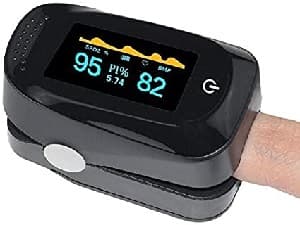
These are the most common types of pulse oximeters. The finger pulse oximeters are usually attached to your fingertip to monitor the oxygen level in your blood without causing any pain. These are very compact and easily portable, also easy to use. It is the most preferable choice for most of the clinics and hospitals as well as home use because of its quick and accurate readings and affordable price.
Wrist Pulse Oximeter
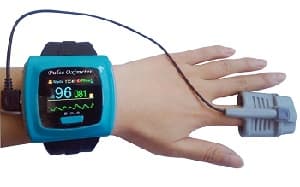
These oximeters are typically small in size and lightweight, very similar to a wristwatch. It works by wearing the device on to your wrist and placing the sensor on to your finger. The best part is that these oximeters are used for continuous monitoring of oxygen level and heart rate, even while sleeping too.
It comes with a long battery life and soft style sensors that do not strain your fingers despite prolonged usage.
Another best feature of wrist pulse oximeters is that some advanced models come with multiple sensor and wrist band size options so that anyone can use it from pediatrics to adults.
Handheld Pulse Oximeters
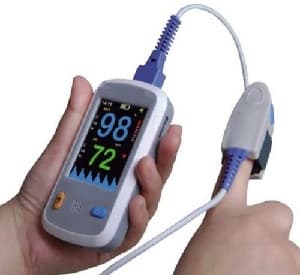
Handheld oximeters are the most sophisticated and popular types of pulse oximeters. It comes with a probe and a handheld display screen. A separate reusable sensor at the end of a length of cable is clipped onto the finger, and the other end is plugged onto the handheld oxygen saturation screen. It also allows you to attach the clip on the toe in case of an emergency.
It comes with various features like audible alarms, data storage memory, and rechargeable batteries. But these devices are a bit expensive over other types and are typically used by hospitals and other medical institutes.
Tabletop Pulse Oximeters
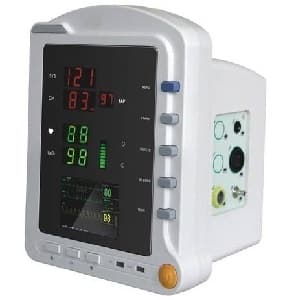
Like the name, these oximeters are comparatively bigger in size that you can place on the tabletop. The tabletop pulse oximeters are used in various clinical applications, in hospitals, medical facilities, post-operative care, patient transport, and emergency medical services (EMS).
With the adjustable audio and visual alarms, it notifies you when the pulse rate or oxygen level falls.
Pediatric Pulse Oximeter
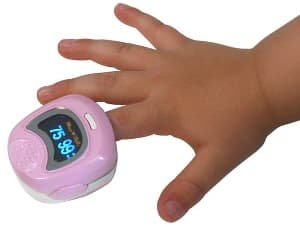
The pediatric pulse oximeters are designed to check the oxygen level (SpO2 %) and heart rate from primarily the toes and/or fingers of neonates, infants, and kids under four years of age. Some advanced models also come up with anti-motion features that provide accurate measurements even while the kids keep moving their hands and legs.
How does a Pulse Oximeter help in detecting COVID-19?
Apart from fever and dry cough, COVID Pneumonia is one of the most severe symptoms found in many Coronavirus patients. This disease affects the lung’s ability to transfer oxygen. It also causes problems in breathing. And, when a person cannot inhale enough oxygen and exhale enough carbon dioxide, the pneumonia can cause death.
The normal oxygen level must be above 95%. In coronavirus patients, the oxygen level drops significantly, and they feel breathless. In some cases, with a drop in oxygen level, their kidneys, heart, brain, and all the vital organs stop working.
Therefore this smart device, the Pulse Oximeter, is used for the early detection of COVID Pneumonia. Those who found positive or suspected to have been infected with coronavirus can check their oxygen levels in the early stage. If they find a drop in oxygen levels, they can seek additional treatment, or emergency room visit immediately.
How does a Pulse Oximeter Work?
A pulse oximeter combines a sensor or probe and a monitor with a display screen. The probe is on the finger, sometimes on the toe, or earlobe. And the device detects the flow of blood through your finger, toe, or earlobe.
The pulse oximeter basically measures the light absorption in the blood. The device probe consists of two parts: light emitting diodes (LED) and a light detector. The light emitting diodes shine two types of light, a red light, and infrared light. On the other end, the light detector senses how much of each light is absorbed and how much is allowed to pass through the finger (or earlobe or toe).
The working principle includes that the oxygenated hemoglobin can absorb more of the infrared light, allowing more red light to pass through. On the other hand, deoxygenated hemoglobin absorbs more of the red light, allowing more of the infrared light to pass through.
The oximeter then calculates the wavelength’s difference between an invisible infrared light and a visible red light. And this difference determines the oxygen saturation level in your body.
The pulse oximeter provides real-time results in percentage on a small LED display present on the device.
Steps to Use a Pulse Oximeter
- Turn on the device.
- Clip the device on to your finger, or toe, or earlobe. If you are using your finger, make sure that the sensor is placed on the fingernail.
- Leave the probe for ongoing monitoring of oxygen saturation level and pulse rate. Most of the oximeters will get you a reading within 10 seconds. Avoid much movement during this time.
- Once the monitoring is done, the readings are displayed on the screen.
- Now check your SpO2 level and heart rate from the screen.
- After checking the reading, remove the oximeter and turn off the device. Some smart models also come with auto power off.
How to Use Pulse Oximeter Properly? (Some Important Tips)
- Read the instruction manual carefully before using the device.
- Avoid movements while using the pulse oximeter.
- Make sure that the probe of the device is correctly positioned.
- Never use the fingertips oximeter on painted nails as it will affect the reading accuracy. In case of an emergency, it is better to use it on the earlobe or toes.
- Also, make sure that the patient’s hand is positioned at heart level.
- Never use it in direct light like sunlight as it results in inaccurate readings.
- Make sure to perform the pulse oximetry procedure in a room with adequate lighting. Though the device comes with a soft rubber that shields it from the light, it is advisable to avoid direct light shining on it.
- Patients involved in fires or inhaled smoke may have significant amounts of Hb combined with carbon monoxide (CO). This carbon monoxide poisoning may lead to inaccurate readings.
- The device works better with warmer hands than cold hands.
Features to look for Before Buying a Pulse Oximeter
1. Accuracy
For any healthcare device, the primary concern is that the readings it offers must be accurate. In the case of pulse oximeters, almost all the models provide an accuracy of ±2% in readings. So, you must check the error percentage of the model you are using.
Also, check the perfusion index of the oximeter. But note, the one with the lower perfusion index is more accurate and precise.
Note one more point that the accuracy of an oximeter is also affected by your motion. So, it is better to choose a model that is more tolerant to hand movements.
2. Size of probe or sensor
To get the accurate readings, it is also very much important that your finger fits properly to the probe of the oximeter. To accommodate the adults’ finger size, most of the oximeters come with the probe size ranging from 0.3 inches to 1 inch. So, you can choose accordingly that fits your finger best.
But if you are buying the pulse oximeter for children or people with small hands, choosing a pediatric pulse oximeter will be a great decision.
Even, many more advanced models also come with the adjustable spring system that can easily fit a wide number of finger sizes from kids to adults, providing accurate results.
3. Response time
No one wants to wait for a longer period to get accurate readings of their pulse rate and blood oxygen level. Thankfully, the latest and advanced models of pulse oximeters will provide accurate readings within ten seconds. Some also take a bit more. The choice depends on you.
4. Size of the Display
Considering the display size of the pulse oximeter is another most important thing. It will be great if you choose the one with a bigger LCD screen. It ensures clear visibility of the data it provides. Make sure that the screen should be bright, even with a Backlit option that allows you to see the readings clearly in both light and dark mode. Plus, the readings it provides should be large enough so that you can read it easily.
5. Auto-Rotate Screen
The model that features auto-rotate functionality on its screen is a great deal. It allows you to read the data from multiple viewing angles, making it much easier and convenient while reading the data.
6. Alarms and warning System
An alarm or warning system in a pulse oximeter is very much important. It notifies you in case you have an irregular heartbeat or low SpO2 levels. Almost all the models come with an audio-visual warning system to alert you about these irregularities. It will be more advantageous for you to choose a model with a customizable warning system, so you will never miss out any irregularities found.
Also, almost all the models come with low battery indicators, either visual or audible. It tells you to replace the battery for further assessment.
7. Ease of Use
If you are looking for the pulse oximeter for home use, make sure that it comes with easy functionalities so that you can operate it easily. Almost all the models are easy to use by just clipping your finger and tapping a button for getting accurate results of your heart rate and oxygen level. Even many latest models display results in various ways that will be easier for you to understand.
8. Battery type
For any pulse oximeter, you may choose either lithium-ion batteries or alkaline batteries. Both have their pros and cons, and the choice depends on you. Lithium-ion batteries last much longer and are rechargeable. On the other hand, alkaline batteries need replacement when it dies.
But in terms of price, alkaline batteries are much cheaper than lithium-ion batteries.
9. Portability
Choose the model that is light in weight and easy to carry with you all along. It allows you to check your SpO2 levels wherever you are. Portable oximeters are also good for pilots, athletes, etc.
Finger pulse oximeters are the best choice if you are searching for a portable oximeter. Many models also come with a smart carry case so that you can carry it without worrying about the damage.
Also, make sure to choose a water-resistant model. It ensures more safety of the device from the splashes or drips of water or sweat.
10. Durability
Durability ensures the longevity of the product. For pulse oximeters, it is always good to invest in a branded and good quality device. It ensures that you can use the device uninterruptedly in the long run.
A good quality pulse oximeter always comes with sturdy and durable construction. Also, make sure to check that it comes with features like waterproof construction, protection against humidity, and also do not break when dropped down.
Many models also come with removable silicon covers that protect the device from breaking after dropdown.
11. Design and type
Since we have already discussed above the different types of pulse oximeters, you can choose the one that suits you best. Fingertip pulse oximeters are the most ideal choice in every manner. Its light-weight design, compact size, and smooth operation make it the best choice for both home and professional use.
Wrist-worn pulse oximeters are ideal for continuous monitoring of heart rate and oxygen level. On the other hand, tabletop pulse oximeters and handheld pulse oximeters are comparatively bigger and great for hospitals and clinics.
More importantly, if you want to keep an eye on the heart rate and oxygen level of your kid, you must buy a pediatric pulse oximeter.
12. Price
Everyone will prefer to buy the best model of oximeter that comes in his/her budget range. On the basis of features, specifications, quality of the material, accuracy, etc. the price of the pulse oximeter differs from one another. The more the features and functionalities, the more you would have to pay.
Generally, the quality oximeters price ranges from Rs 1000 to Rs 10,000. Here we have covered only the best quality pulse oximeters from the well-known brands and surely in your budget range.
13. Warranty
Warranty on any product defines its quality and durability. Most of the manufacturers offer a 1-year standard warranty on their pulse oximeter; some even extended for 1.5 years to 2 years. It is advisable to opt for a model with a longer warranty. It ensures that you can use the device for the long run.
Some More Smart Features to Consider
- Auto Shut off function to save battery power.
- Memory feature to save few previous readings.
- Multi-person memory to save more that one person records.
- Storage case for neat and clean storing of the device to protect it from damage.
Cleaning and Maintenance Tips for Pulse Oximeter
- Keep the battery fully charged before using it.
- Clean the probe between patients. When using a disposable probe, discard when needed.
- When the probe gets dirty, clean it gently with a damp cloth or alcohol swab.
- Make sure to turn off the device before cleaning.
- Position it safely to avoid damage by dropping or spillages.
- Coil the oximeter probe loosely for storage or carrying. Avoid coiling too tightly as this will damage the wires inside the cable.
- Some models come with low battery indicators notifying you to replace them when the battery is low.
- Always keep the pulse oximeter in a dry place.
- Take out the batteries from the battery compartment if you are not going to use the device for a long time.
Frequently Asked Questions (FAQs)
- Should you buy a pulse oximeter for home?
- Buying a pulse oximeter for your home use depends on your own medical situation. If you or anyone in your family have some breathing disorders or lung diseases like asthma, or COPD, the device is very useful for your home use. Even in this pandemic situation, where breathing issue is one of the most common symptoms of COVID-19, it is a must-have device for every home.
- What does the pulse oximeter measure?
- A pulse oximeter measures the percentage of arterial oxygen in your body. It is actually the amount of oxygen carried on blood haemoglobin which is termed as SpO2. So, generally, the device measures the blood oxygen saturation level in your body. It also measures your heart rate.
- What are the two readings on a pulse oximeter?
- The two readings on a pulse oximeter indicates: one for the oxygen saturation level and the other for heart rate.
- What are the normal ranges for SpO2 level and heart rate?
- The normal ranges of heart rate and oxygen saturation levels are:
Heart Rate: 60-100 beats/min
Oxygen Saturation Level: 95-100%
Though the normal range for oxygen saturation is 95-100%, this level is not considered to be dangerous until it drops below 92%. In that case, if it falls below 92%, the person is in the state of hypoxia and needs immediate hospitalization and oxygen therapy. - How to use a pulse oximeter?
- Using a pulse oximeter is very simple. You just need to clip it on your finger, a toe, or an earlobe. Switch on the machine and let the machine take the readings. Some models can also be used on your forehead and chest. To ensure accurate readings, the patient’s less or no movement is recommended.
- Which finger is best for pulse oximeters?
- To get accurate readings of your heart rate and oxygen saturation level in your body, it is best to use your index finger in the device.
Conclusion
That’s all on our gathered information on the pulse oximeters. From the blog, I am sure you are now clear how a pulse oximeter is an important part of your medical kit, especially when COVID-19 is at its peak.
Hope the buying guide we have covered will let you know all about it and how important it is for you. You can also select the best model from our picked list, as we have researched out to find the most reliable option for you. Even these are budget options, too, with quality fully assured.
So, what are you waiting for? Browse now from our list and get the best one suiting your needs and budget.
Still, if you feel we have missed out something, share your thoughts, feedback, and suggestions via the below comment section.
